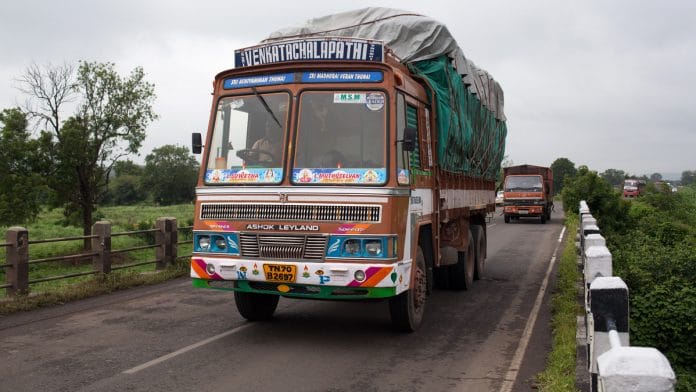New Delhi: Truck drivers and owners have come up with a novel way to make the government listen to their demands. Starting August, they will not purchase any commercial vehicle for three months.
This decision, taken by the All India Transporters Welfare Association (AITWA), has received support from many major regional associations such as the Bombay Goods Transport Association (BGTA) and the Calcutta Goods Transport Association (CGTA).
With this move, the transporters aim to bring the government’s attention to some of their grievances. With their problems not getting addressed, they say, it has been “becoming unviable” to continue their services.
‘Want to send a signal to government’
The transporters’ grievances range from a continued categorisation of trucks and tyres under the highest GST slab to the recently announced 2 per cent TDS on cash withdrawals of over Rs 1 crore.
The transports’ decision comes at a time when India’s automobile sector is grappling with a slowdown, and it can put further downward pressure on the sales of commercial vehicles. The segment had recently registered a 9.53 per cent decline in sales in the April-June 2019 quarter as compared to the same period last year.
Mahendra Arya, senior vice-president of AITWA, told ThePrint, “It’s neither feasible nor right to go on a strike every time. Everyone suffers from it. The association, therefore, has decided to not purchase any vehicle for the next three months.”
“We are not doing anything to trouble others but it’s becoming increasingly difficult to purchase and operate vehicles under the current economically-stressed situation. We just want to send a signal to the government to listen to us,” he added.
Also read: Caught in a slowdown, India’s auto sector sees no hope for growth until festival season
Budget woes
Some of the measures announced in the government’s July 2019 budget have not gone down well with the transporters. Finance Minister Nirmala Sitharaman had raised excise duty and road and infrastructure cess by Rs 1 each, thereby increasing petrol and diesel prices by Rs 2 per litre.
To discourage cash transactions and increase digital payments, she had also announced a 2 per cent tax deduction at source (TDS) on cash withdrawals of over 1 crore in a year.
Criticising these decisions, Arya said, “The government never takes our problems seriously and only gives us assurances. In the budget, they added Rs 2 more to diesel prices, which has affected our profitability margins.”
“The 2 per cent TDS also severely affects our business as cash is central to it. When a driver leaves with a truck, we give him cash for expenditures such as diesel, toll and food. While the rule in general might be good, it makes our operations very difficult. Banks won’t give credit cards to our drivers,” he said.
Highest GST slab
The auto sector currently falls under the 28 per cent GST slab, the highest, along with luxury and sin goods and cement. The central government has found it difficult to reduce the slab rates on automobiles and cement because of the huge revenue implications it will have.
Transporters, however, are calling it “highly unfair”.
“This slab [28 percent] mostly has luxury and sin goods, so why should trucks and tyres, which provide livelihood to ordinary people be a part of it. The condition of the market is deteriorating while our costs have hit a peak. Many transport companies are on the verge of closure,” Arya told ThePrint.
Also read: GST is slowing down India’s renewables industry, cutting jobs potential, says study






